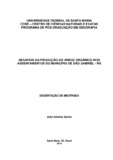| dc.creator | Zanon, João Silvano | |
| dc.date.accessioned | 2015-12-01 | |
| dc.date.available | 2015-12-01 | |
| dc.date.issued | 2015-04-09 | |
| dc.identifier.citation | ZANON, João Silvano. Organic rice production challenges settlements in the municipality of São GabrieL-RS. 2015. 129 f. Dissertação (Mestrado em Geociências) - Universidade Federal de Santa Maria, Santa Maria, 2015. | por |
| dc.identifier.uri | http://repositorio.ufsm.br/handle/1/9441 | |
| dc.description.abstract | This research addresses the organic rice production process in the settlements Madre Terra, Cristo Rei and Zambeze and the impacts that such production engenders in São Gabriel / RS. With the crisis of conventional production model and the environmental, social and economic, resulting from the intensive use of agrochemicals, is included in the company an efficient production model, it is the agroecological agriculture developed during the production of organic rice process. From the literature focused on the topic of interest, as the struggle for land in Brazil and Rio Grande do Sul, the agro-ecological production strategies and the production of organic rice, it was possible to grasp the organic production system in question. To meet the objectives of the investigation, which presents a qualitative approach, was developed through semi-structured interviews, which were conducted with family farmers and settlers technicians COPTEC and ATES. Finally, it is evident that the productive organization of organic rice requires active participation of the community and technicians during the production process, because the organic management requires manual and daily work, and also the constant search for techniques and technologies that best suit the reality of the place and the variety of cultivated rice, and this form of production builds relationships between society and nature, modifying the configuration of the territory, incorporating a form of organization and different life, creating a new agriculture and a new farmer . | eng |
| dc.description.sponsorship | Fundação de Amparo a Pesquisa no Estado do Rio Grande do Sul | |
| dc.format | application/pdf | por |
| dc.language | por | por |
| dc.publisher | Universidade Federal de Santa Maria | por |
| dc.rights | Acesso Aberto | por |
| dc.subject | Arroz orgânico | por |
| dc.subject | Agricultura agroecológica | por |
| dc.subject | Reforma agrária | por |
| dc.subject | Organic rice | eng |
| dc.subject | Agroecological agriculture | eng |
| dc.subject | Land reform | eng |
| dc.title | Desafios da produção do arroz orgânico nos assentamentos do município de São Gabriel-RS | por |
| dc.title.alternative | Organic rice production challenges settlements in the municipality of São GabrieL-RS | eng |
| dc.type | Dissertação | por |
| dc.description.resumo | A presente pesquisa aborda o processo de produção do arroz orgânico nos assentamentos Madre Terra, Cristo Rei e Zambeze e os impactos que tal produção engendra no município de São Gabriel/RS. Com a crise do modelo de produção convencional e os impactos ambientais, sociais e econômicos, decorrentes da intensa utilização de agroquímicos, se insere na sociedade um modelo de produção eficiente, trata-se da agricultura agroecológica desenvolvida durante o processo produtivo do arroz orgânico. A partir do levantamento bibliográfico centrado no tema de interesse, como a luta pela terra no Brasil e no Rio Grande do Sul, as estratégias de produção agroecológica e a produção do arroz orgânico, foi possível apreender o sistema produtivo orgânico em questão. Para atender os objetivos da investigação, que apresenta uma abordagem qualitativa, foi desenvolvida, através de entrevistas semiestruturadas, que foram realizadas com os agricultores familiares assentados e técnicos da COPTEC e ATES. Por fim, evidencia-se que, a organização produtiva do arroz orgânico necessita participação ativa dos assentados e técnicos durante o processo produtivo, pois o manejo orgânico exige trabalho manual e diário, e também, a busca constante por técnicas e tecnologias que melhor se adaptam a realidade do lugar e a variedade de arroz cultivado, sendo que, esta forma de produção constrói relações entre a sociedade e a natureza, modificando a configuração do território, incorporando uma forma de organização e vida diferente, gerando uma nova agricultura e um novo agricultor. | por |
| dc.contributor.advisor1 | Wizniewsky, Carmen Rejane Flores | |
| dc.contributor.advisor1Lattes | http://lattes.cnpq.br/9604409518707631 | por |
| dc.contributor.referee1 | Pessôa, Vera Lúcia Salazar | |
| dc.contributor.referee1Lattes | http://lattes.cnpq.br/8077097760507038 | por |
| dc.contributor.referee2 | Miorin, Vera Maria Favila | |
| dc.contributor.referee2Lattes | http://lattes.cnpq.br/2237199224220458 | por |
| dc.creator.Lattes | http://lattes.cnpq.br/1563879514574434 | por |
| dc.publisher.country | BR | por |
| dc.publisher.department | Geografia | por |
| dc.publisher.initials | UFSM | por |
| dc.publisher.program | Programa de Pós-Graduação em Geografia | por |
| dc.subject.cnpq | CNPQ::CIENCIAS HUMANAS::GEOGRAFIA | por |


